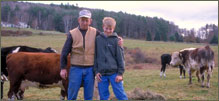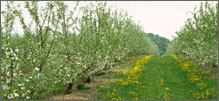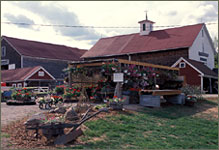Occupational Traditions – Agriculture & the Family Farm
Agriculture in New Hampshire has a long history.

Bob Graves and his grandson
Andy Westover in a pasture
of on their family farm in Walpole, NH.
Great Brook Farm has been in
the Graves family since the 1760s.
Settlement of northern New England began in the mid 1600s with land grants from the King of England. By the mid 1700s, small farms were sprinkled in townships through much of the area, usually along river valleys. Most farmers had small subsistence operations. Those who wanted to make money commercially focused upon sheep, dairy, and orchards.
Early farmers in New Hampshire encountered a rocky, heavily forested landscape with a thin coating of topsoil. Oxen-and later draft horses-were the powerhouses behind clearing boulders and tree stumps from the land. When the railroad connected northern New England to the west in the 1830s, farmers began to leave the difficult conditions of New Hampshire to establish farms in the Midwest.
The rich soil of the Midwest attracted farmers from many parts of the country. In the 1870s, Grange societies emerged to provide up-to-date information for farmers and opportunities for socializing. Grange societies spread across the country and though farming in New Hampshire declined in the late 1800s, Grange Halls became a feature of rural life, usually with a large kitchen and a stage for local productions.

Apple orchards are often part
of a family farm. More and more
orchards are specializing in
heirloom varieties.
Over the years, some of the small and commercial farmers who stayed in New Hampshire were lured by the promise of higher wages at the textile mills in cities such as Manchester and Nashua. By the late 19th century, thousands of farms in New Hampshire had been abandoned or simply failed.
When the plowing stopped, trees sprouted and wood industries followed. But the agricultural character of New Hampshire never faded from the hearts of the people.
Farms in New Hampshire preserve much of the open landscape of the state. As the New Hampshire Department of Agriculture, Markets and Food puts it, "Farming provides the fields, pastures and meadows. that afford views of the hills, valleys and mountains. Without farming, there would be no barns, silos, or sugar houses that give our state its special character."
As of 2003, there are some 3,100 individual operations qualifying as commercial farms in New Hampshire, managing over 150,000 acres of cropland. There is another 250,000 acres devoted to pasture, maple and Christmas trees, conservation and other agricultural uses.
Most farms in New Hampshire are small, averaging 30-40 acres, while some are larger, ranging from 150 to 300 acres. Flowers and shrubs from greenhouses and nurseries are the largest agricultural products. Others include milk and dairy products, fruits and vegetables, (strawberries, blueberries, apples, peaches, corn, pumpkins, squash, herbs, etc.) hay and forage, horses, livestock (beef, sheep, swine, and poultry), Christmas trees, maple syrup, and honey. Unusual sights such as Llama farms and Buffalo farms are even popping up on the rural landscape.
Family farms have survived by keeping up with the latest innovations in agriculture like diversifying production and trying out new products. One of the best sources for this information is the University of New Hampshire's Thompson School of Applied Science based in Durham.

Like many farms in New Hampshire,
Beach Hill Farm in Concord
has diversified their operation to
keep the farm in the family.
They sell ice cream, plants, crafts,
jams, dairy items, and other goodies,
organize special events,
construct a corn maze on the hill
and have a collection of
farm animals for kids to see.
Recently, apple orchards and dairy farms, in particular, have been hard hit by the modern global economy. Farmers in New Hampshire are resourceful and some orchards have begun specializing in heirloom apples (old varieties difficult to grow in commercial quantities) – some orchards grow as many as 70 different types of apples-linking us to our past with our taste buds! Some dairy farmers have successfully bottled their own milk for sale, or developed specialty products such as organic milk, cheese and pudding, etc. While the dairy industry is still dealing with uncertainty, marketing alternatives such as these give producers more direct control over the sale of their milk.
Other strategies used to help keep farms going, include farm stands, pick your own orchards, and taking produce to a local farmers' markets. Some farms hold cultural events all through the growing season with traditional music, crafts, and activities for the whole family. In this way, they contribute tremendously to the cultural life of our state.
For more information on agriculture in New Hampshire visit these websites:
Photo credit: Lynn Martin Graton
New Hampshire State Council on the Arts
19 Pillsbury Street - 1st Floor, Concord, NH 03301


